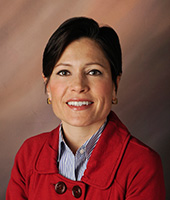Why Kraft Foods Cares About Fair Trade Chocolate
As vice president for sustainability at Kraft Foods, Chris McGrath has been pivotal at guiding the company’s sustainability efforts. With its global reach and massive market shares, the company is setting new standards on how to source through sustainable agriculture and keep packaging out of landfills.
Topics
Leading Sustainable Organizations

Chris McGrath, vice president for sustainability at Kraft Foods
With 23 years in the food industry, Chris McGrath is responsible for balancing the environmental, social and economic considerations across Kraft Foods’ global portfolio. Her job: helping to ensure that sustainability is a part of every business decision. McGrath works with business teams around the world to reduce Kraft’s environmental global footprint and deliver Kraft’s sustainability commitments.
Last year the company laid out a plan to divide into two independent public companies — a North American grocery business, Kraft Foods Group, Inc., and a global snacks business, Mondel?z International, Inc. McGrath will become vice president for external affairs at Mondel?z International, with broad oversight for the new company’s sustainability, health and wellness and public affairs initiatives, beginning October 1.
Among the Kraft brands are staples of many American children’s lunches: Oscar Mayer hot dogs and lunch meats, Capri Sun and Kool-Aid beverages, JELLO-O gelatin desserts, Nutter Butter and Oreo cookies.
In 2010, Kraft acquired the esteemed U.K. chocolate company Cadbury, and, according to Forbes, became a confectionary powerhouse: “Kraft has now become the biggest player in the global chocolate industry with popular brands like Dairy Milk, Creme Egg, Flake, and Green & Black’s.” Forbes estimated that Kraft’s global market share in chocolates and candies was 12.5% in 2011.
The Cadbury product line has opened up new sustainability avenues for the U.S. company. “Kraft Foods has been on a sustainability journey for quite a few years,” says McGrath, “but we’ve had an increased sense of focus since 2006. Much of what we’d done in the past was in our manufacturing operations and was viewed as efficiency — doing more with less. That work continues, but we’ve gone beyond that by building sustainability into our business strategy and changing our corporate culture. A particular focus is to invest in the sustainability of the key agricultural commodities that we buy.” In 2011, for instance, Kraft increased its sustainable sourcing of agricultural commodities by 36%. It’s now the world’s largest buyer of Fairtrade Certified cocoa and Fairtrade Organic cocoa.

Comments (2)
ziontrain
leslief